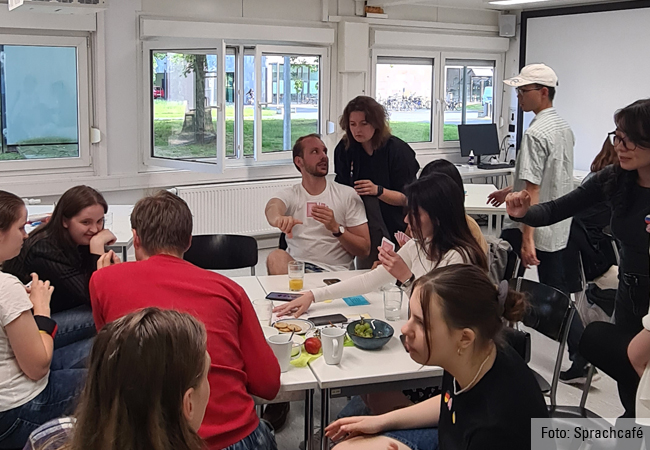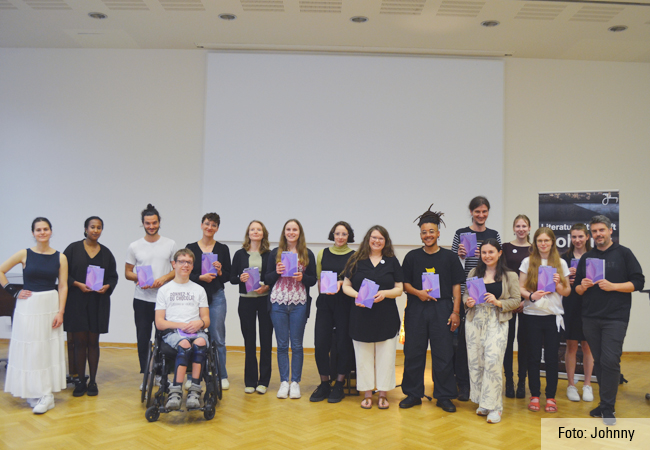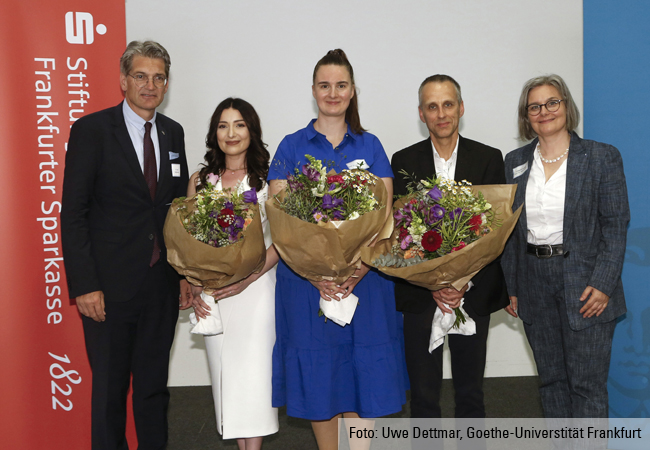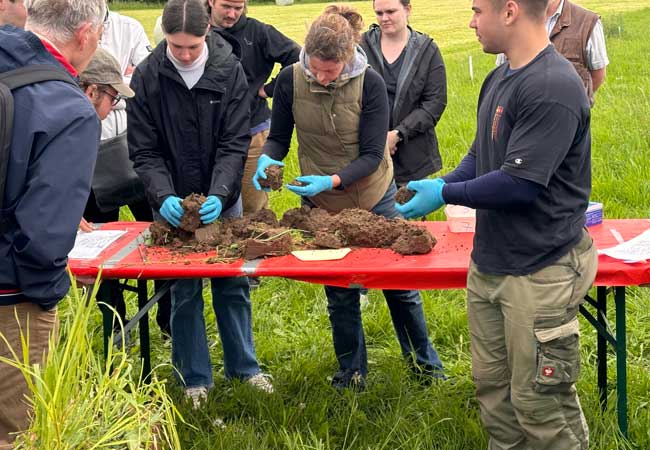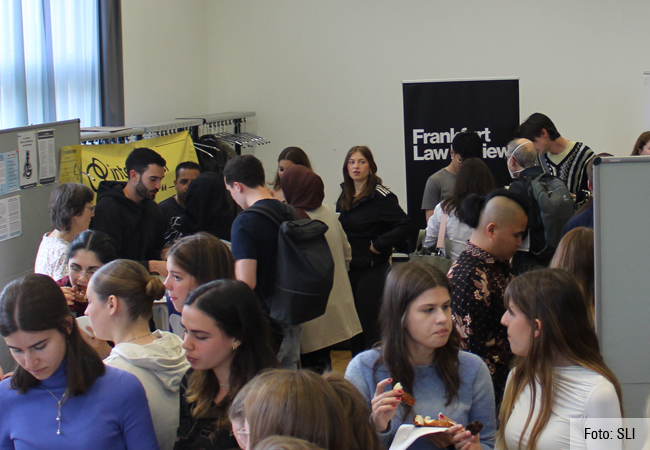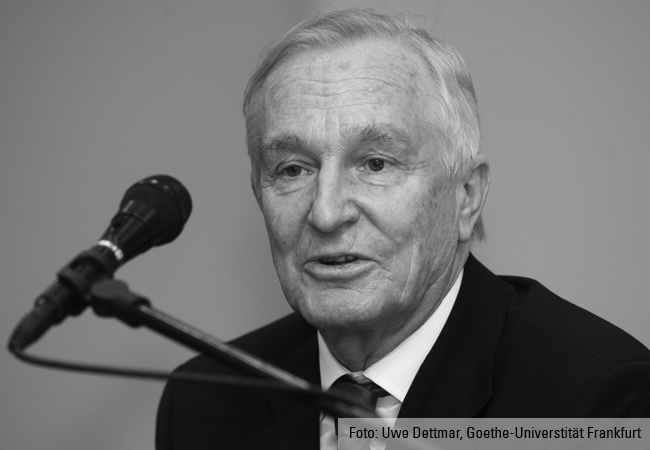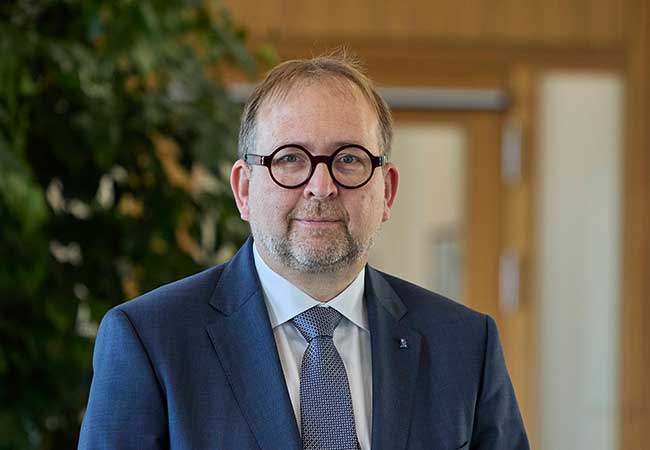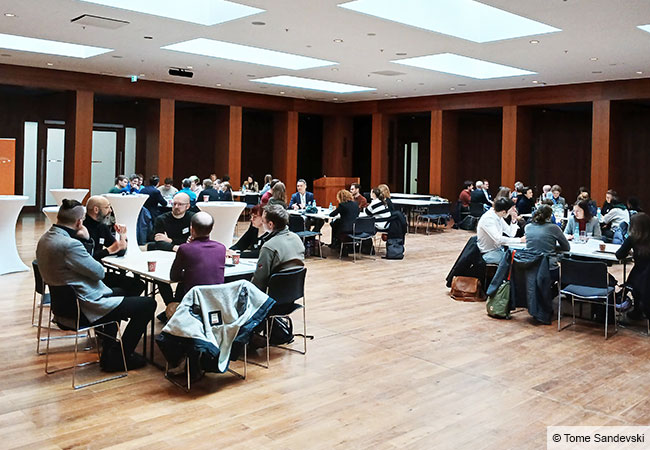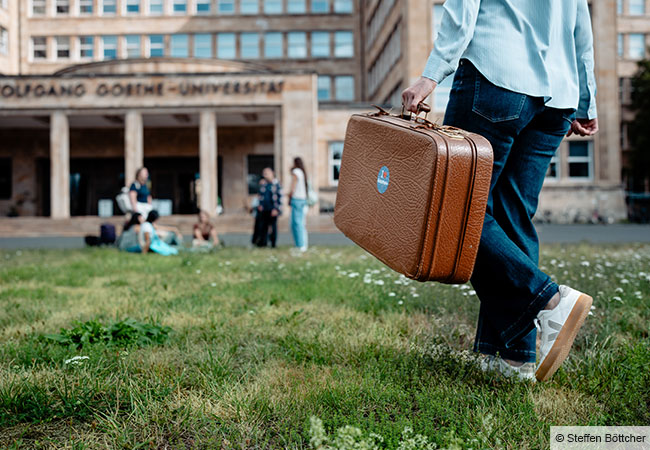The Generative AI working group examines how AI is affecting Goethe University Frankfurt. We spoke to Julia Schmitt and working group leader Dr. David Weiß – both of whom are part of studiumdigitale, the university’s central e-learning institution – about why technology roll-outs alone are insufficient and why it’s important to keep calm in the face of the AI hype.
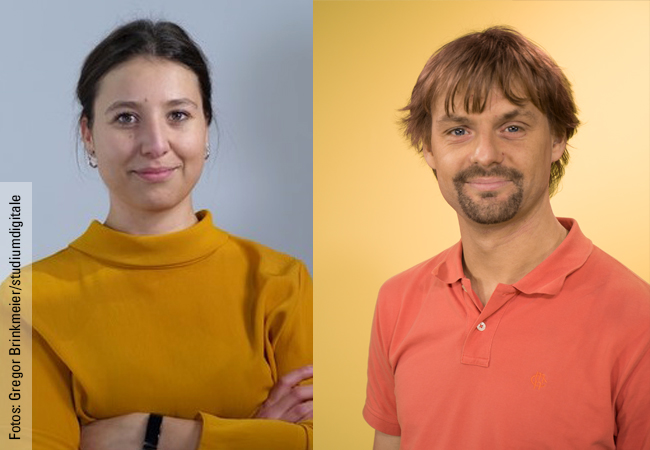
UniReport: “Experiment, don’t ban!” was the recommendation from Nora Hoffmann, head of Goethe University Frankfurt’s Writing Center, on how to deal with ChatGPT, shortly after the AI chatbot was launched. Is that also the position on which the Generative AI working group was founded?
Dr. David Weiß: Yes, this central statement was the most important aspect when our working group was set up. It provided clarity for all teaching staff about Goethe University’s position on the topic. At other Hessian universities, by contrast, distinct reservations about and sometimes even objections to AI have been voiced.
Julia Schmitt: Our starting point was that any AI that exists will also be used. That is why, at the initiative of Professor Christiane Thompson, former Goethe University Vice President Teaching and Study, the AI working group was established from a cross-section of disciplines and status groups.
Weiß: Our first step was to prepare a handout for teaching staff and students, in which we tried to address their fears and reservations. Can I use AI when writing my final dissertation? If so, what conditions apply? These are some of the questions students are asking. Issues that concern teaching staff include whether they can prohibit the use of AI if, for instance, it makes sense for students to develop things for themselves.
Schmitt: The handout that went online in September 2023 was actually named one of the four best-practice examples from German universities by the Hochschulforum Digitalisierung [editor’s note: the nationwide think-&-do-tank is a joint initiative of the Stifterverband, the CHE Centre for Higher Education and the German Rectors’ Conference HRK]. One reason for this accolade was that we also explicitly addressed the recommendations to the students.
How has Goethe University handled AI up to now?
Weiß: The future is already here, but it’s unevenly distributed. Only a few faculties are pushing forward with AI.
Schmitt: But there are also some teaching staff, who have not yet dealt much with the topic, who then read an exam script or a final dissertation and notice something odd about it. For teachers, the crux of the matter is this insecurity about whether and how students should use AI, and whether the staff should allow it. On this point, the teaching staff are pretty much left on their own – and will remain as such, as long as the topic continues to be discussed across Europe.
What does it mean for the working group that different subjects deal with AI in different ways?
Weiß: Even though AI is such a hyped topic, people shouldn’t feel hugely pressurized by it. We could spend years, maybe even decades, on ChatGPT searching for answers to all manners of questions. Here at studiumdigitale, we apply the so-called SMS process, which means Scouting, Maturing and Service. We are currently in the scouting phase, which means we are trying to build up a collection of best practices in a community using a tool lab. I for one have integrated AI into the teaching process of my IT class to the effect that everything may be used, but has to be documented accordingly. What we do is solve a certain task with the aid of AI, then come up with our own answer, and subsequently discuss what happened.
Was the initial experience with AI more disappointing or more inspiring?
Weiß: The experience in my seminar was mostly inspiring but sometimes disappointing, too. AI appears to be an amazing research aid, capable of seeing the context of a very broad thematic field in areas where you may not yet have a clear overview. In research in particular, this opens up many possibilities to identify new connections between studies that maybe did not exist before.
Can AI act as a sparring partner during the writing process?
Schmitt: Many students have a problem getting started, and find themselves staring at a blank sheet of paper. This is where the use of AI can serve as an “ice breaker” if you will. In addition, it no longer matters what language the papers I receive are written in because I can get them translated on the spot.
What happened in your seminar? Did people sometimes also take a critical view of AI?
Weiß: In my IT seminar I noticed that the topic of AI generated more discussion overall. This debate is in essence a process of reflection that sets in irrespective of the answers provided by the AI. So there’s quite a lot of critical examination.
Schmitt: But the reason why we want to establish this community of practice is that all faculties use AI in completely different ways. That means we have to pose the question of how useful AI is at least 16 times, i.e. once in each faculty, not least since many people actually think that AI functions in the same way everywhere.
If every subject has to examine where it makes sense to use AI and where it doesn’t, it will take some time before differentiated answers are available.
Weiß: That’s right. After all, you not only have to look at the importance of AI in a particular subject. Today, AI applications are also available locally on my computer, which I can feed with my own literature list or seminar notes to generate summaries.
Can I be sure that AI does not use my private documents and colleagues’ publications, which are protected by law, for other things?
Weiß: No, you can’t – issues with copyright and data protection remain. But to get back to the question of the added value of AI in individual areas: You might find that AI in fact comes up with ideas we don’t have on our radar at all, because the application has read a lot more than we have. That being said, it is just as possible that it simply regurgitates a vague mass of many things, i.e. the answers that were fed into it.
Does AI already have long and medium-term consequences for degree programs?
Weiß: Goethe University Frankfurt is currently creating interdisciplinary AI degree courses, such as the ones emerging from the ALI project. Other programs will have to adapt their requirements. There will definitely be a lot of changes.
In your handouts you also touch on ethical aspects…
Weiß: … which of course include the explicit disclosure that AI has been used.
Schmitt: More than anything else, however, this has to do with access to tools, including who can access a given tool at what time, and who has the best version. Here we are talking about the distribution of resources and accessibility – something that has consequences for our education system. These ethical aspects also include the fact that older literature, which hasn’t been digitized yet, doesn’t feature in AI. This in turn raises the question: How is AI affecting our understanding and our knowledge of the world?
Another ethical question concerns the underrepresentation of women or marginal societal groups, sometimes to the point of not being represented at all. To give just one example: ChatGPT could be prompted with the command “Imagine you’re a computer scientist with 20 years of professional experience, including programming in JavaScript. Now write me a code on the topic of such-and-such.” The AI will then provide me with a program code. But if I change my prompt to, “You’re a female computer scientist with 20 years of professional experience,” and request the same program code, the results delivered are poorer, i.e. at a simpler level.
It seems as though regardless of the culture in individual subject areas, a professional and critical attitude to AI should probably be part of every degree program…
Weiß: Today no student can comfortably say they don’t want anything to do with it. As for us, we actually have an obligation to train people – and here I am referring to both students and teaching staff. Basically, what we are witnessing right now is a new wave of media skills.
While you’re trying to train people, AI just keeps developing…
Weiß: Therein precisely lies the difficulty. We explain prompt engineering to students at a time when this practice is still evolving and changing. What’s more, the members of our working group are tackling this task in addition to our regular jobs. The group’s success will be determined by our ability to focus on a few areas, where through good, clean work in technical, legal and ethical terms, we can create a representative use case. Other universities have taken a different approach; some brought out tools much faster only to find that people didn’t use them. So there’s more to it than just rolling out the technology – you have to ensure that it is accepted.
Schmitt: We recently set up our community of practice in the form of a generative AI website, where people can register as teachers or students. Using a somewhat more advanced forum, teaching staff and a few selected students will in future be able to discuss specific tools and specific learning scenarios.
What about the costs?
Weiß: That’s another unanswered question. We have absolutely no way of estimating how the costs will develop. Theoretically speaking, one person entering texts stored on their computer into an AI application could end up using the entire data allowance. That is something we now have to test thoroughly. At the end of the day, we may end up buying licenses for 16 small AI applications – one for each faculty.
At the same time, we must consider where we want to integrate AI into existing infrastructures and learning management systems. We also have to ask at what point we might have to provide our own models on our own hardware because we’re handling highly sensitive administrative data. We’re already discussing this with Mr. Schielein [editor’s note: Ulrich Schielein is Goethe University’s Chief Information Officer (CIO)].
With regard to sustainability, what’s the situation like as far as energy consumption is concerned?
Weiß: This factor mostly comes into play when training generic models such as ChatGPT, which indeed consume huge amounts of resources. At the same time, it’s amazing how fast progress is being made on energy consumption. This is an area where time is working slightly in our favor. But it’s another topic we’ll take up with Mr. Schielein, and have already agreed to use a cloud infrastructure, which can handle large quantities of data and large models much more efficiently. Another aspect that comes into play here is large computing centers, which are much more efficient than small ones – like our “Green Cube” high-performance computer center. Beyond that, the CSC [Center for Scientific Computing at Goethe University] also offers some options, while the state of Hesse is making efforts to provide the relevant infrastructure, including via hessian.AI [Hessian Center for Artificial Intelligence]. All this considered, nodes will form in the medium term, offering massive computing power for short-term rental.
Goethe University also has the C3S Center for Critical Computational Studies, which is to support this digital future with critical awareness…
Weiß: C3S is also a member of our working group, and I imagine that after the launch phase we’ll hand certain topics over to them. That’s a good thing. As a university, we have to continue pushing the boundaries of thought and outline potential next steps, including the question of what ideas AI triggers through its mere existence.
Is the working group planning to supply empirical data for the research conducted at C3S?
Weiß: Yes, the community of practice and the tools could become the subject of qualitative research and be developed in the direction of learning analytics. But in general, AI is a topic that affects us all and can only be mastered if it’s supported and developed by everyone, including university management and staff.
Questions: Pia Barth
The Generative AI working group website (in German):
https://gki.studiumdigitale.uni-frankfurt.de/


